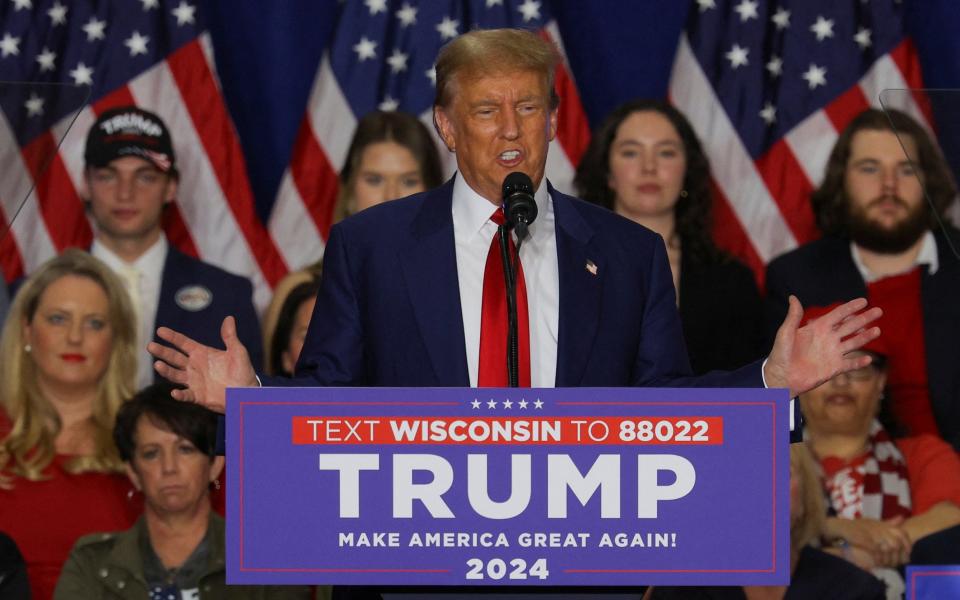

President Vladimir Putin faces just three rivals in Russia’s March 15-17 presidential election after anti-war candidates were barred from running. But Leonid Slutsky, Nikolai Kharitonov and Vladislav Davankov do not pose much of a challenge for the Russian leader, who is all but guaranteed to secure another six-year term.
Advertising
The first polls in Russia’s March 15-17 presidential election opened in the country’s easternmost Kamchatka Peninsula region at 8am local time Friday, with the vast voting exercise spanning 11 time zones set to finish in the westernmost Kaliningrad enclave at 8pm on Sunday.
The election holds little suspense. Incumbent Vladimir Putin – who has been in power either as president or prime minister for nearly a quarter-century – is set to secure another six-year term.
But a longtime autocrat requires a veneer of legitimacy, even in Russia. Voters will thus have a choice between the almost guaranteed victor and three pre-approved candidates.
Ultranationalist Leonid Slutsky of the Liberal Democratic Party of Russia (LDPR), Vladislav Davankov of the relatively liberal New People’s Party and veteran candidate Nikolai Kharitonov of the Communist Party are the supporting characters in 2024’s electoral choreography. In a possible sign of Russia’s shrinking tolerance for political challenges, that’s four fewer candidates than qualified for the 2018 presidential election.
Competition and criticism was severely curtailed in the lead-up to the 2024 vote, with authorities blocking a number of opposition hopefuls and critics using a variety of means, including labelling them as “foreign agents”.
“Between the ‘foreign agent’ labels, the fines, imprisonments and the incredible hardening of the regime, the number of candidates is limited. However, they represent real political forces. The nationalist right carries political weight in Russia, as do the Communists, whose score could be in the region of 10 percent,” noted Jean de Gliniasty, former French ambassador to Russia and current senior research fellow at the French Institute for International and Strategic Affairs (IRIS).
Read more‘Noon against Putin’: Navalny widow realises his last wish for the Russian opposition
‘I don’t dream of beating Putin’
But while some of the candidates represent established political parties, they do not pose much of a challenge to Putin, nor have they put up much of a fight on the campaign trail.
Shortly after registering his candidacy in December 2023, Slutsky – the candidate from the ultranationalist LDPR founded by the late right-wing populist Vladimir Zhirinovsky – appeared certain of defeat.
“I don’t dream of beating Putin. What’s the point?” Slutsky told reporters. The 56-year-old Russian politician who chairs the Foreign Affairs Committee of the Russian lower house, the State Duma, then predicted “a huge victory” for Putin.
At 75, Kharitonov is the oldest candidate on the ballot. A veteran Communist Party politician who has been a State Duma deputy since 1993, Kharitonov ran for president in 2004, coming in second to Putin with 13.7 percent of the vote.
This time, Kharitonov ran a low-key campaign, focused on Soviet-era issues, including criticising capitalism, promoting industrial nationalisation and an increase in the Russian birth rate.
Davankov, 39, is the youngest of the opposition candidates. The former businessman-turned-politician promotes greater freedom for businesses and a stronger role for regional authorities.
The deputy chairman of the State Duma, where his party holds 15 of the 450 seats, Davankov has tried to position himself as a candidate opposed to the Kremlin’s excessive curbs on personal freedoms. He favours peace talks with Ukraine, following the Kremlin’s official line, while reiterating that it should be “on our terms and with no rollback”, meaning Russia should not cede territory it has occupied.
Read moreFive things to know about Russia’s upcoming presidential election
“Each candidate presents juxtaposed ideologies and domestic policies, but collectively these contribute to Putin’s goal of tightening his grip on Russia during his next presidential term,” noted Callum Fraser of the Royal United Services Institute (RUSI) in a column, “Putin’s Grand Plan for Russia’s 2024 Elections“.
According to Putin’s critics, these three quasi-opponents, integrated into the Russian political system, perform an important function: to channel the discontent of various strata of society and provide a pluralist veneer for the vote, while the real opposition has been wiped out by years of repression.
“Throughout history, Russian power has always been extremely careful to respect formal rules. Even a very authoritarian regime faces public opinion and cares about it. This election remains a test of Putin’s legitimacy and popularity. Even if this test appears to be a formality, it has value for those in power,” explained de Gliniasty.
No political space for anti-war candidates
But not all positions on the political spectrum are represented on the ballot this year. In the lead-up to the presidential election, criticism of the Ukraine invasion was effectively suppressed with the arrests of tens of thousands of peaceful protesters. Hefty fines were also slapped on anyone voicing opposition to the war, according to international rights groups.
Two independent presidential hopeful running on anti-war platforms, Yekaterina Duntsova and Boris Nadezhdin, were barred from running by the Central Electoral Commission (CEC).
While the CEC barred Duntsova in December, Nadezhdin’s candidacy attracted attention, with thousands lining up in cities across Russia in January to give their signatures supporting the anti-war candidate.
That did not work in Nadezhdin’s favour.
“The question obviously arose of leaving out a voice that could have played a symbolic role and brought in, dare I say it, left-leaning, liberal voters. Boris Nadezhdin could have stood for election if he had achieved a modest score, but faced with the enthusiasm generated by his candidacy, the Kremlin preferred to send him packing,” explained de Gliniasty.
A ‘noon vote’ campaign for Navalny supporters
Despite the sweeping crackdowns, some of Putin’s opponents have vowed to express their opposition at the polls. On March 5, Alexei Navalny’s widow Yulia Navalnaya called the election a “masquerade” and urged Russians to cast protest votes.
“You can vote for any candidate except Putin. You can spoil your ballot paper, you can write ‘Navalny’ in big letters,” she urged.
In an action called “Noon against Putin”, Navalny supporters plan to go to their local polling station on Sunday exactly at midday, stand in line for a voting slip, and then vote in a way that expresses their protest.
Such social mobilisation comes with serious risks. Some Navalny supporters received letters last week warning them that prosecutors had reason to believe they will be participating in an illegal event that “bore signs of extremist activity”, an accusation Russia often levies at enemies of the Kremlin.
The ‘non-war’ across the border
Although the outcome of the vote is certain, the authorities have gone through great lengths to encourage Russians to go to the polls, dialing up the patriotism and presenting the vote as an essential step towards “victory” in Ukraine.
Over the past few weeks, Putin did several media appearances with the heroes of the “special military operation”, as the Ukraine war is still called in Russia.
But the campaign did not feature any debate on the conflict in Russia’s neighbouring state.
“One might have expected the subject of war to be central to the election campaign,” said Anna Colin-Lebedev, a specialist in post-Soviet societies at Paris-Nanterre University. “However, the debates – which did not excite the Russian public – were mainly devoted to other subjects such as education, culture, the economy, agriculture, demographics [and] housing” in what she called a “framed”, pre-approved narrative.
More than two years after Moscow launched a full-scale invasion of Ukraine, the Kremlin is attempting a tricky balancing act on the subject, according to experts.
“The authorities are caught in a contradiction,” noted de Gliniasty. “They want to talk as little as possible about the war in Ukraine, as if to say that everything is fine, that everything is normal and that it’s just a special operation. But at the same time, it wants this election to serve to legitimise the invasion.”
Read more‘I know Putin can eliminate me’: Russian opponent speaks out as election gets underway
The turnout barometer
Given the stakes, the authorities are deeply invested in keeping up appearances by holding elections under the guise of a functioning democracy.
“These elections are very important for the Kremlin,” Nikolai Petrov of London-based Chatham House told the AFP. “It is needed to demonstrate that Russians overwhelmingly support Putin” during the military offensive.
Turnout then becomes a critical issue, as it does in most authoritarian countries holding questionable elections.
Some managers at state companies have ordered employees to vote – even asking them to submit photographs of their ballot papers, reported Reuters, quoting six sources who did not want to be named. Cash machines also remind Russians to vote. And in Russian-occupied Ukraine, residents have complained of pro-Russian collaborators with ballot boxes going from house to house looking for voters accompanied by armed soldiers.
Then there’s the question of vote-rigging.
“Parliamentary elections may be rigged in Russia, but presidential elections are not,” de Gliniasty said. “There are cameras and observers in polling stations. There’s no need for rigging because everything has been cleaned up beforehand so the result will be perfectly acceptable.”
But given the context of the Ukraine war and the hardening stance of the Russian regime, “we cannot predict what will happen in these elections”, admitted the former French ambassador.
Putin won nearly 77 percent of the vote in 2018, 14 points more than in 2012. At the country’s helm for almost a quarter-century, the indisputable master of the Kremlin has yet to name a successor. Putin signed into law a constitutional amendment in 2021 that altered term limits and will allow him to remain in power until 2036.
This article has been translated from the original in French.
EMEA Tribune is not involved in this news article, it is taken from our partners and or from the News Agencies. Copyright and Credit go to the News Agencies, email [email protected] Follow our WhatsApp verified Channel









